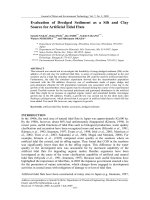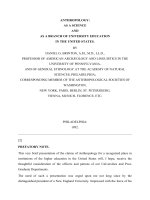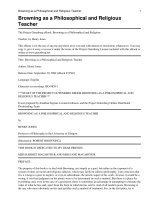Like as a preposition and conjunction
Bạn đang xem bản rút gọn của tài liệu. Xem và tải ngay bản đầy đủ của tài liệu tại đây (14.52 KB, 2 trang )
Like as a preposition and conjunction
The word like exhibits several different grammatical properties. It can be used as a preposition, a conjunction, an
adjective or an adverb.
Like as a preposition
When used as a preposition, like is followed by a noun.
She looks like her mother.
He walks like his dad.
Like as a conjunction
In informal English,
like
is sometimes used as a conjunction instead of
as
. This is very common in American
English.
Nobody understands her like I do. (Informal)
Nobody understands her as I do. (Formal)
Like
If you are like somebody you are similar to him or her.
She is like her mother.
It was a small bird like a sparrow. (= The bird was similar to a sparrow.)
She was like her brother. They were both excellent writers.
No one can play the piano like he does.
Like
can be used with the modifiers
just
and
very
.
My neighbour has bought a new car just like mine.
He is very like his brother in many ways.
We can use
like
after the copular verbs
seem, look, sound, smell, taste
and
feel
.
As
is not usually possible in
this case.
She seems like a good candidate for the job. (NOT She seems as a good candidate for the job.)
He looks like his brother. (NOT He looks as his brother.)
Feel like
Feel
can be followed by like or as if / though.
She felt like she was in a dream. (= She felt as if she was in a dream.)
Feel like
can also mean ‘want’ or ‘would like’.
I feel like singing. (= I want to sing.)
Like new
If something is like new, it looks like it is new.
They just applied a coat of paint and the house was like new.
Be first to know when grammar rules change! Sign up to our newsletter here: englishgrammar.org (It's free)
Powered by TCPDF (www.tcpdf.org)









